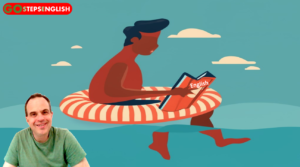 Later today I will be taking my kids to their swimming lessons.
Later today I will be taking my kids to their swimming lessons.
It is true, they don’t always want to go.
Too much effort for them.
They sometimes argue, shout and scream they don’t want to go.
I often want to give in to them.
It’s an easier life, right?
Less fuss, less bother. Stay at home. Learn nothing.
It got me thinking if there are any links to learning to swim and learning English.
Did you like that shoehorn?
Number 1) Staying afloat/ Not sinking.
It takes a huge leap of faith to jump into the water. The same as jumping into learning a language. Once you have got in, how do you avoid sinking?
Number 2) Building Confidence.
As learners progress, they gain confidence. Whether it’s forming sentences in English or mastering swimming strokes, practice and perseverance contribute to a sense of accomplishment.
Number 3) Different Strokes for Different Situations.
Just as swimmers use different strokes for various situations, language learners adapt their language use to different contexts. They learn formal and informal language for diverse settings.
Number 4) Lifelong Skill.
Both skills are lifelong assets. Once acquired, they stay with individuals and can be used in various situations throughout life.
Number 5) Safety and Integration.
Learning to swim is not only enjoyable but also a safety measure around water. Similarly, English proficiency enhances safety and integration in environments where English is the primary language.
Those are my thoughts.
What other learned skill would you relate learning English to?
Let me know in the comments.
